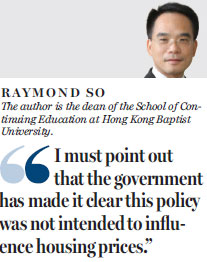'Hong Kong Property for Hong Kong People' policy has been misunderstood
Updated: 2016-09-01 07:44
By Raymond So(HK Edition)
|
|||||||||
In 2012, the government introduced the "Hong Kong Property for Hong Kong People" policy. Apartments built under this scheme can only be purchased and owned by Hong Kong permanent residents for the first 30 years. The policy gives Hong Kong residents priority over non-residents when buying a flat, with the aim of helping Hong Kong people fulfill their dream of gaining property ownership. Many commentators interpret the policy as an attempt by the government to solve Hong Kong's housing problems.
The government made it clear at the very beginning that it had no intention of intervening in the property market. The message was clear: The government only wanted to ensure Hong Kong residents had priority over non-residents in buying local properties; there was no attempt to influence property prices. Four years after the launch of this policy, the first batch of housing units built under this scheme are now up for sale. To the disappointment of many people, these flats were priced at prevailing market rates. The wishful thinking of some people that this policy would lead to a substantial discount in housing prices was not realized.

I must point out that the government has made it clear this policy was not intended to influence housing prices. It only imposes restrictions on non-resident ownership but no restrictions on the pricing of such housing units. However, despite this clear policy objective being made known, a section of the public still counted on the policy, hoping that it would help lower housing prices; many young people who have been complaining about unaffordable housing prices have been hoping this policy would bring them some cheaper apartments. When these people find the policy has not led to lower housing prices they become disappointed. The government has therefore come under fire.
In theory, by restricting ownership to Hong Kong people only, this policy should have a negative impact on the prices of such projects because they have a lower investment value. Housing prices are comprised of the value of accommodation and the value of investment. If other things are kept equal, a drop in the investment value due to restriction on non-resident ownership will lead to a lower price. The drawback of this theory is that the value of non-resident ownership in Hong Kong properties is already near zero. The government has installed many other administrative hurdles to prevent non-resident ownership of Hong Kong properties. This policy is just one of them. Current housing prices already reflect these restrictions over ownership. Hence, it is not surprising to observe that there is no big difference between those apartment units built under this policy and ordinary apartments in terms of pricing. The "Hong Kong Property for Hong Kong People" policy has achieved its objective of eliminating non-resident ownership of Hong Kong properties. It also demonstrates that, in the long run, restrictions on non-resident ownership cannot solve the problem of high housing prices. The real solution still rests on the provision of more land recourses for housing.
This policy also reveals that there are strong public expectations for lower housing prices. People hope that government policies will lead to affordable homes. If such hope fails to be met, the dissatisfaction could be intense. It also proves the value of good expectation management. When policies do not meet people's expectations, no matter how successful these policies are in achieving their stated objectives, they still cannot appease the public.
(HK Edition 09/01/2016 page1)